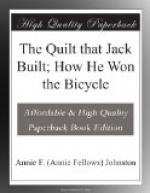That evening, with every curtain drawn tight, so that no prying outsider might see and tell, and ready to run at the first sign of an approaching visitor, Johnny sat down on the hearth-rug, tailor fashion, to begin the quilt. A slateful of calculations had shown him that, by making five blocks every evening and fifteen every Saturday, he could finish by Christmas. Todd would wait until then for his money. Three hundred and fifty blocks would give him enough for the rifle, and half a dollar besides for ammunition.
“Well, Johnny,” said Mr. Marshall, teasingly, “I suppose your mother signed a contract for this. ‘There’s many a slip,’ you know. What would you do if the turkeys died before Christmas, and she couldn’t pay you?”
“Huh! No danger of mother’s not keeping her word!” answered Johnny, with a confident wag of his head. “She said she’d pay me, not only the day, but the very hour they were done. Didn’t you, mother?”
“Yes, son,” was the smiling answer, as she put the first block into his hands, and the quilt was begun. Not only the quilt, but a series of quiet evenings long to be remembered by the Marshall family. The picture of Johnny bending over his patchwork, his serious little face puckered into an anxious frown, as he tugged at the thread with awkward fingers, is one of the ways they love best to think of him. They still laugh heartily over the time when he rolled under the sofa, work-basket and all, to escape the eyes of a gossipy neighbour, who had knocked unexpectedly at the side door, and who stayed so long that he fell asleep and snored loudly.
The following Saturday morning, Mrs. Marshall, going out to the barn for a hatchet, heard voices on the other side of the partition. Peeping through a crack, she saw a sight that confounded her.
Every boy in the neighbourhood seemed to be there, and every one was making patchwork. One boy was dangling his feet over the manger, several were perched on a ladder, and one was sitting cross-legged on a huge pumpkin. Johnny was going around as Grand Inquisitor from one to another. If a seam was puckered, he gave the unlucky seamstress what they called a “hickey,”—a tremendous thump on the head with his thumb and middle finger. If the stitches were big and uneven, he gave two hickeys and a pinch, and one boy got half a dozen, because Johnny said his dirty hands made the thread gray. Mrs. Marshall gathered that it was some sort of secret society, and that they had signed an oath in their own blood not to tell.
“Johnny is at the bottom of it,” she thought, laughing as she went back to the house. “He has set the other boys to sewing in order to forestall them. Now they cannot tease him, should they hear of his private quilt-piecing.”
[Illustration]
Another week went by of peaceful, uninterrupted evenings, and every night at bedtime Johnny counted out his tale of finished blocks with a sigh of relief. On the second Saturday evening he disappeared immediately after supper. It was nearly an hour later when he came tumbling excitedly into the house.




